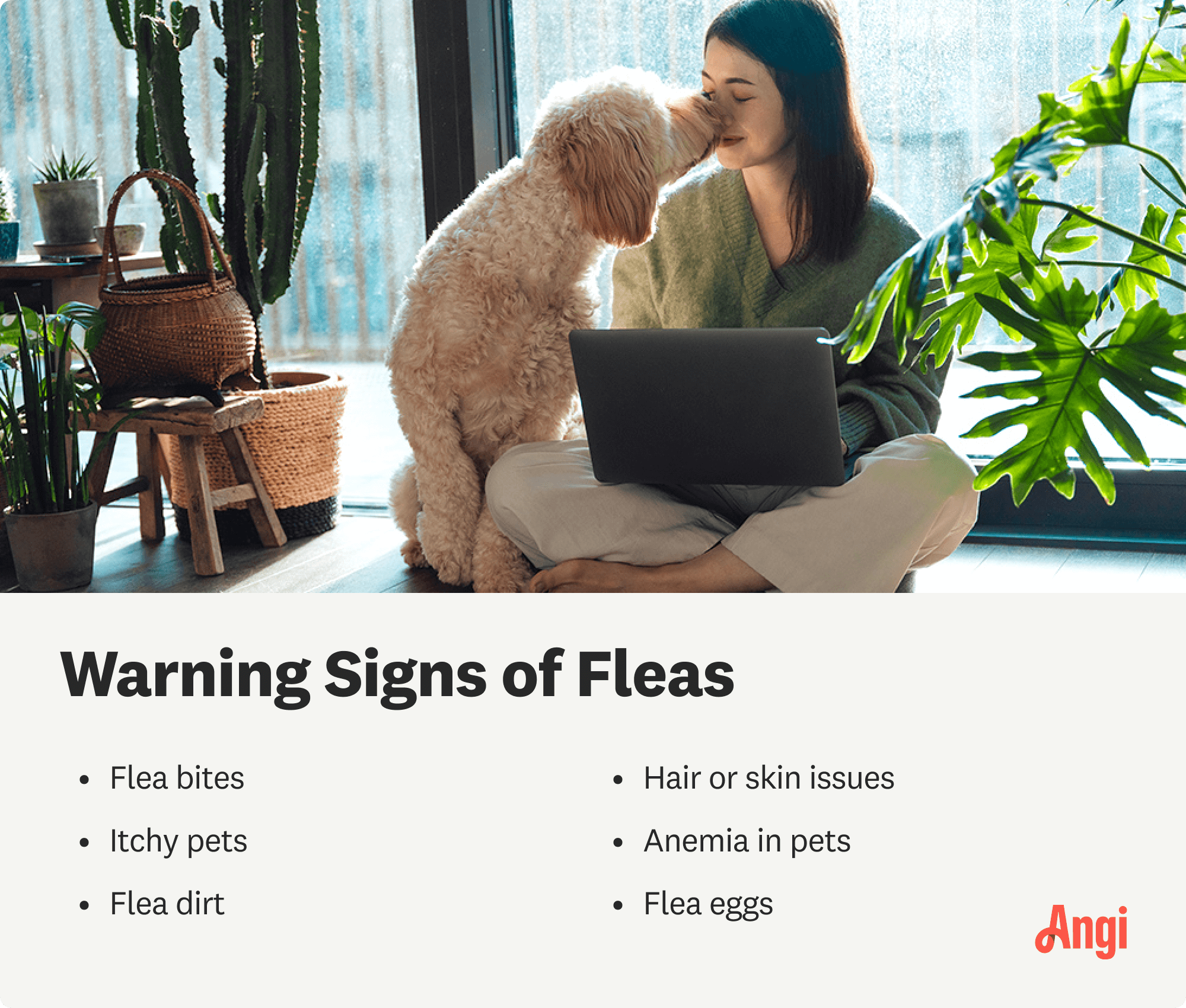
If you discover a wasp nest near your home, you’ll want to remove it ASAP. Learn wasp nest removal cost factors in this guide.
Sure, fleas need hosts, but there are other things that can attract them into your house


Fleas are mainly attracted to light and heat to help them find hosts.
Fleas can smell CO2 that people and animals breathe out.
These pests use their senses to find hosts, and they feed on blood.
Hiring an exterminator is the best way to control a flea infestation.
For pet owners, finding fleas can be annoying and stressful for you and your furry friends. Determining what attracts fleas can help pinpoint the cause and eradicate them quickly.
Fleas feed on their hosts’ blood, leaving behind itchy, irritated skin. But if you put your pets on flea preventatives and you’re still finding fleas at home, you may wonder how they got there and what attracted them. As it turns out, fleas are looking for more than a host to feed on.


So, what are fleas attracted to exactly? Fleas need to feed on hosts, and they find their next meal using their senses to track down a combination of things, such as light, warmth, carbon and dioxide. Because fleas are attracted to various things you can’t quite control, homeowners need to take extra precautions to deter these pests.
Although fleas don’t have the best vision, they can use light and shadows to track movement. Where there is movement, there could be a host. One study on fleas and flea traps published in Medical and Veterinary Entomology found that fleas were particularly attracted to intermittent light traps and green lights. The intermittent light mimics the lights and shadows that occur when potential hosts move in front of a light source, which is one way fleas use their senses to track down a host.
Fleas can’t tolerate temperatures that are too cold (below 46 degrees Fahrenheit) or too warm (above 95 degrees Fahrenheit). To survive and reproduce, fleas are looking for warm temperatures, around 70 to 85 degrees Fahrenheit. These warm temperatures can also indicate that a host is nearby, another reason fleas may be attracted to warmth.
Humid environments provide fleas with the ideal conditions for them to survive, breed, and lay eggs. They need a certain level of humidity to live, and warmer temperatures can enhance flea activity and growth. Drier conditions can cause flea larvae to become dehydrated, which can shorten their lifespan and make it difficult to survive. That’s why flea infestations are more common in warmer climates than those that have harsher winters.
Some scents, such as decaying matter from food waste and perspiration, can attract fleas, but carbon dioxide is the primary smell fleas are attracted to.
If you think back to science class, you’ll recall that humans breathe in oxygen and breathe out carbon dioxide. Fleas have a strong sense of smell that can detect changes in carbon dioxide in the air, which often means there’s a host nearby. Fleas will move toward the source of the carbon dioxide, as it usually signals a host.
Fleas may be more prone to biting certain humans and animals based on their breathing patterns alone. Those that have heavier breathing patterns and release more CO2 may find themselves with more of those pesky, itchy bites from fleas.
Now that you know what attracts fleas, it’s time to consider why you’re finding fleas around the house. While you can’t control the warm-blooded, carbon dioxide-emitting humans and animals around the home, you can look into other potential sources of fleas.
Whether you have friends over for puppy play dates or you like to leave food out for wildlife or neighborhood cats, you can attract fleas from other animals in and around your home. Your pets may pick up fleas from their daycare, at the dog park, or from family’s and friends’ pets that visit.
As for wildlife, while you may not be inviting deer or opossums inside for dinner, these critters may be attracted to your yard for many reasons. You may leave pet food in bowls out on the patio, or you have piles of scrap wood that make handy nesting sites for wildlife. Whatever the case, other wildlife looking for food and shelter may come onto your property, bringing fleas with them.
Remember, fleas are looking for warmth. With its tall grasses, weeds, and leaf piles, your yard may be especially attractive and warm places for the fleas to make their shelters. An unruly lawn and even a few piles of clutter are enough to make fleas feel at home. From there, they can simply hitch a ride when your pet is outside.
If you’ve been dealing with fleas for a while and had a professional treatment or two, it’s important to keep to a regular schedule. A flea can lay up to 50 eggs per day, meaning these pests can spread quickly. Regular treatments are more likely to eradicate the problem fully, but missing your treatment schedule can lead to another infestation.
To find fleas, you’ll need to follow what attracts fleas. That will mean checking pets and humans in the house for signs of fleas, and you may even use traps to check for fleas around the house.
Watch for excessive scratching from both humans and pets in the house.
Check for raised, itchy bumps on the skin.
Look for fleas crawling on pets. You can use a fine-toothed flea comb to check fur for fleas.
Use green lights or intermittent light traps to lure fleas. Note that traps may help kill a few fleas, but they aren’t much help in fully getting rid of a flea infestation.

You can repel and prevent fleas in your home and yard using natural ways to kill fleas and commercial products or professional treatments. Typically, natural methods will work best if you only see a few fleas, while hiring a professional insect exterminator near you is the most effective way to get rid of fleas for good.
Consult your vet to find a flea treatment and preventative routine that works for your pets. Your vet may recommend any number of products, including medications, ointments, shampoos, or flea collars to help kill any fleas on the pet and prevent more fleas from making your pets the host.
You’ll need to work with a professional exterminator to help kill fleas since some repellants and treatments may only work for adult fleas versus flea eggs or larva. The exterminator may recommend different treatment options, from steam to fumigation to spraying, depending on the infestation. You may need multiple visits to get rid of existing fleas and repel more of the pests from coming into your home in the future.
While fleas have an impressive sense of smell, one of the only smells they are attracted to is carbon dioxide. Many scents can repel fleas, including mint, rosemary, lavender, eucalyptus, and citronella. You may consider adding some pet-friendly plants that repel pests to your garden to help keep fleas at bay.
One important thing to keep in mind with repelling fleas via unpleasant scents is that using essential oils may repel the fleas, but they can also be extremely toxic to pets, even when inhaled. It’s best that pet owners use diffusers in rooms and spaces that are not accessible to pets.
It may be tempting to skip mowing, leave the kiddie pool full of water overnight, or push cleaning up the clutter for another week. But keeping up with your yard maintenance checklist is essential to preventing fleas and other pests from finding shelter in your yard. Even leaving standing water or some pet kibble out around the yard can attract other animals—and their fleas—into your yard.
Flea extermination costs about $75 to $400, depending on the type of treatment and the size of the infestation. An initial inspection starts around $75, and the main treatment costs up to $400. If the infestation returns, you may need to spend another $200 for additional visits. But don’t give up—keeping up with treatments will eventually help get rid of the fleas around your home and yard for good, and professional extermination is far more effective than DIY methods.
From average costs to expert advice, get all the answers you need to get your job done.

If you discover a wasp nest near your home, you’ll want to remove it ASAP. Learn wasp nest removal cost factors in this guide.

Whether you have bugs, bats, or rodents invading your home, you’ll want to contact an exterminator quickly. Find out how much pest control costs in Columbus, OH.

Sometimes birds nest in unwelcome places. Find out how much bird nest removal will cost based on factors like location, bird species, and preventative measures.

Many popular cockroach treatments are harmful or annoying for pets. We’ve collected the alternatives that get rid of roaches without the same dangers.

Don't let termites turn your home into a tasty snack. Instead, prevent termites by following these 10 easy tips to save your home and your wallet.

“Water bugs” typically refer to a type of cockroach. Find out how to get rid of them instantly and keep them away for good in this handy DIY guide.